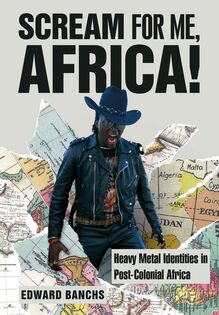-
 Univers
Univers
-
 Ebooks
Ebooks
-
 Livres audio
Livres audio
-
 Presse
Presse
-
 Podcasts
Podcasts
-
 BD
BD
-
 Documents
Documents
-
- Cours
- Révisions
- Ressources pédagogiques
- Sciences de l’éducation
- Manuels scolaires
- Langues
- Travaux de classe
- Annales de BEP
- Etudes supérieures
- Maternelle et primaire
- Fiches de lecture
- Orientation scolaire
- Méthodologie
- Corrigés de devoir
- Annales d’examens et concours
- Annales du bac
- Annales du brevet
- Rapports de stage
La lecture à portée de main
Vous pourrez modifier la taille du texte de cet ouvrage
Découvre YouScribe en t'inscrivant gratuitement
Je m'inscrisDécouvre YouScribe en t'inscrivant gratuitement
Je m'inscrisEn savoir plus
Vous pourrez modifier la taille du texte de cet ouvrage
En savoir plus

Description
Scream for Me Africa! examines the hard rock and metal scenes in five African countries: Botswana, Togo, South Africa, Kenya and Ghana. Banchs spent significant time in each country interviewing musicians, producers and fans to create vivid pictures of each of these rarely discussed scenes. These scenes are 'a disruption of the norm, a disruption of what we have come to expect from Africa and rock and metal music'. He has chosen to shed light on these particular scenes now because of their difference and because they are reflections of their countries.
This exciting new book considers how heavy metal's subculture is viewed in Africa, and how musicians in the continent have stepped forward to make this genre their own. It looks at the continent's blossoming scenes through various themes including hybridity, othering and how scenes have collided with their difficult political systems.
Scream For Me, Africa! Is the first book of its kind and an engaging look at the various metal scenes across the African continent, and how they are constructing an identity as metal fans in their modern nation states under the shadow of post-colonialism. Written in a clear, approachable manner it is accessible to academic and non-academic readers.
Edward Banchs is a freelance writer and independent scholar – and a metal fan – based in Pittsburgh, Pennsylvania, USA whose writing has appeared in The Guardian, Afropop, Metal Hammer, Metal Music Studies and The Pittsburgh City Paper. He is also author of Heavy Metal Africa (2016).
This new book fills a gap in the market for an academic text on metal in Africa, expanding published scholarship on metal in the global south. It book has potential use as a resource on courses in several disciplines including sociology, cultural studies, musicology, ethnomusicology, sociology and Africa studies. It will also be of interest to the more general readers with an interest in the musical genre.
Will appeal to anyone who is interested in metal, African culture, anthropology and sociology and history. Particularly musicologists and ethnomusicologists and those with an interest in metal in the global south.
Acknowledgements
Introduction: Redefining the Boundaries of Scenes
PART I: HEAVY METAL AND CULTURAL CONFRONTATIONS
1. Arka’n Asrafokor and the Reinvention of Togo
2. Dark Suburb: The Rebellious Sons of a Nation and the Amplifying of the Silent in the City of Hope
3. Lights, Camera, Leather! Kalahari Snapshots, Global Visions and Marginal Existences
PART II: HEAVY METAL AND POLITICAL CONFRONTATIONS
4. Apartheid’s Haze: Finding Clarity through Heavy Metal in South Africa
5. Kenyan Dreams, Nairobi Nights: Heavy Metal and Hope in the Post-Authoritarian Kenya
Conclusion: Confronting Realities through Heavy Metal
Endnotes
References
Index
Sujets
Informations
| Publié par | Intellect Books |
| Date de parution | 19 avril 2022 |
| Nombre de lectures | 0 |
| EAN13 | 9781789385236 |
| Langue | English |
| Poids de l'ouvrage | 1 Mo |
Informations légales : prix de location à la page 0,3750€. Cette information est donnée uniquement à titre indicatif conformément à la législation en vigueur.
Extrait
Scream for Me, Africa!
Scream for Me, Africa!
Heavy Metal Identities in Post-Colonial Africa
Edward Banchs
First published in the UK in 2022 by
Intellect, The Mill, Parnall Road, Fishponds, Bristol, BS16 3JG, UK
First published in the USA in 2022 by
Intellect, The University of Chicago Press, 1427 E. 60th Street,
Chicago, IL 60637, USA
Copyright 2022 Intellect Ltd
All rights reserved. No part of this publication may be reproduced,stored in a retrieval system, or transmitted, in any form or byany means, electronic, mechanical, photocopying, recording, orotherwise, without written permission.
A catalogue record for this book is available from the British Library.
Copy editor: MPS Limited
Cover designer: Aleksandra Szumlas
Cover (front) and frontispiece image: Trooper from Frank Marshall s 2011 Visions of Renegades series. Photo by Frank Marshall.
Cover (back) image: Photo by Lee-Roy Jason.
Production manager: Sophia Munyengeterwa
Typesetter: MPS Limited
Hardback ISBN 978-1-78938-521-2
ePDF ISBN 978-1-78938-522-9
ePUB ISBN 978-1-78938-523-6
Part of the Advances in Metal Music and Culture series ISSN 2752-4426 / Online ISSN 2752-4434
Printed and bound by Lightening Source
To find out about all our publications, please visit our website. There you can subscribe to our e-newsletter, browse or download our current catalogue and buy any titles that are in print.
www.intellectbooks.com
This is a peer-reviewed publication.
Contents
Acknowledgments
Introduction: Redefining the Boundaries of Scenes
PART I: HEAVY METAL AND CULTURAL CONFRONTATIONS
1. Arka n Asrafokor and the Reinvention of Togo
2. Dark Suburb: The Rebellious Sons of a Nation and the Amplifying of the Silent in the City of Hope
3. Lights, Camera, Leather! Kalahari Snapshots, Global Visions and Marginal Existences
PART II: HEAVY METAL AND POLITICAL CONFRONTATIONS
4. Apartheid s Haze: Finding Clarity through Heavy Metal in South Africa
5. Kenyan Dreams, Nairobi Nights: Heavy Metal and Hope in the Post-authoritarian Kenya
Conclusion: Confronting Realities through Heavy Metal
Endnotes
References
Index
Acknowledgements
Writing a book is a test of patience. How you can manage the time to get the research and writing in, versus the balance in your everyday life can push one to limits that few other challenges can. But, I have loved doing this and my patience has remained within reasonable limits because of the people that have encouraged me and pushed me along when I needed it most.
This book begins and ends with Africa. So much from this continent has fascinated me throughout my adult life and I can only hope to continue fulfilling my insatiable curiosities in the future. To those in Africa who were kind enough to answer the questions I had when composing this book: Thank you! And, to my family who never thought my interests in Africa were crazy, and encouraged me to push forward with my goals, I love you and will forever be grateful for the fact that you are always behind me.
In Togo, my sincerest gratitude to Rock, your brothers, your bandmates and your family for welcoming me into your lives for the brief time I was there. It is not usual to have a foreigner following you around with a notebook, voice recorder and camera, but your hospitality and patience will never be forgotten. Beatrice, thank you so much for your translation assistance and for the incredible meal you and your family provided me.
Kankan, I promised that I would keep your character alive and well in the pages of this book, but your patience during Covid and your insight into your beloved Ghana is definitely not an act. Thank you so much for your wisdom and time. I am very much looking forward to seeing your Ghana with you.
In Kenya, this book's chapter would have been difficult without Rico and Patricia. Your hospitality, your patience and your assistance went beyond anything I could have ever imagined. I cannot thank you enough for showing me a Nairobi I have never seen before and for much needed late-night conversations over our favourite records. To Brian Saibore, Daniel Mwangi, Xenostate, DJ Switch, Talal Cockar, Gun (Straight Line Connection), the members of Powerslide, Crystal Axis and I Am Revenge, thank you all for taking the time to meet with me and for understanding the scope of my project. My apologies to Rash for cutting the interview I did with your incredible vocalist – pronounced ‘Roy’. And to Christian Bass, I could not have asked for a better Nairobi ‘roommate’ during my visit. More so, I could have never asked for a better friend throughout this. Thank you for your patience with my obsessive, late-night reading and writing while you were trying to sleep in the next room. Sorry if I kept you up.
To Dumi, David Israel, Juice and Vulture in Botswana, thank you. I know I keep saying I need to return to Botswana, but after 2020, I miss your country's tranquility more than ever.
And, to Marq Vas, Gary Walker, Clive Pearson, Dean Smith, Robert ‘Stretch’ Schoonraad, Claire Martens, Natalie Cowling, David Oosthuizen, Sashquita Northey and Robyn Ferguson: I cannot thank you again for taking the time to speak with me. I know it was a difficult year, but 2020 was the year of Skype for us all. It meant a lot that you would take the time to speak with me, even though you got me out of bed pretty early.
Because few things can actually prepare you for writing a book, it is important to have the comfort of personal and professional guidance to push you along. A rather sizable list is due, and I will do my best in acknowledging everyone I need to in person at some time, but first I need to acknowledge Stacey Marie for somehow – and rather patiently – riding through the vicissitudes of my emotions while conducting the research and throughout my incessant bouts of late-night writing. To Didier Goosens, Nelson Varas-Díaz, Craig Halliday and Claire McGee for your input and for guiding me along to ensure that I never drifted too far off course.
It is fairly bittersweet to have to say goodbye to a few friends during the course of writing this, especially when Herman Le Roux would have thought writing a second book on metal in Africa was super cool. I will miss you, Herman. And to Alex Gordon, I cannot stress how much you will be missed. You are a great friend and an incredible editor. You taught me to dig a little deeper with my questions and to ensure that every reader is considered when writing. It is sad to reach the end of the process knowing you wanted to copy-edit this book and give it a read for me. Knowing that you could not do so was as difficult for me as it was for anyone at the Pittsburgh City Paper who had to pass their stories on to you. Mostly, besides that red pen of yours, we really miss your humour. You and Herman were two of the funniest people I had ever met. Rest well you two.
For the staff at the Gumberg Library at Duquesne University and the Carnegie Library in Pittsburgh, an immense amount of gratitude for your never-ending help and support. To Dylan Lowy for helping me find the way towards Intellect. You helped me more than you would ever know (the Dodgers did get that World Series win after all!). Special thanks to everyone at Intellect for your help in putting this book together.
Introduction Redefining the Boundaries of Scenes
No two art scenes are alike.
Whether one is discussing heavy metal scenes, rock music scenes, jazz, blues, hip-hop, ballet, theatre and even literary scenes, no two exist as mirror images of each other for any variety of reasons. Every single imagination is shaped by not only desire but also by the circumstances that envelop them; social, political and economical models have directed the manner in which an imagination is able to work, compose, perform and create.
Creative minds - and those who appreciate their results - have long celebrated scenes and their geographic origins, comparing their creative output to those with similar interests in other places. Whether it means looking at towns and cities within their own regions or states, or the work of others in disparate countries and continents, where artists are working from provides an opportunity for the artists to relay these circumstances. Yet, so much of the entertainment that is consumed around the world has a Western origin. Further, Africa and African creativity has continually found itself misunderstood, stereotyped, patronized, overlooked or ignored entirely.
Heavy metal is no different.
This genre, one that has grown to become embraced by fans all over the world, has long been dominated by acts with Western origins, relaying Western struggles. With roots in the British midlands in 1970, heavy metal has grown to encompass different musical perspectives, having splintered into countless sub-genres. Musicians and fans have labouriously honed their dedication into creating scenes that exist within the confines of their locality, which have begun to become better integrated into global markets over time. However, there remain metal scenes that often get overlooked (see also Varas-D az 2021 ; Banchs 2016 b; Wallach et al. 2011 ).
This book is about those various scenes in Africa that seldom get discussed. African metal and rock scenes are often overlooked because they are a disruption of the norm, a disruption of what we have come to expect from Africa and from rock and metal music. Further, Westerners have seldom considered the impact these types of music can have on fans outside of this periphery.
My interest in heavy metal stretches back to grade school, when my obsession with the sounds of amplified guitars and the energy that came from listening to heavy metal records grew insatiable. Growing up in rural Pennsylvania, I was unaware of bands existing in my hometown. I figured that the existence of metal bands must have occurred in faraway places such as Los Angeles or New York. That was where bands came from. It seemed
-
 Univers
Univers
-
 Ebooks
Ebooks
-
 Livres audio
Livres audio
-
 Presse
Presse
-
 Podcasts
Podcasts
-
 BD
BD
-
 Documents
Documents
-
Jeunesse
-
Littérature
-
Ressources professionnelles
-
Santé et bien-être
-
Savoirs
-
Education
-
Loisirs et hobbies
-
Art, musique et cinéma
-
Actualité et débat de société
-
Jeunesse
-
Littérature
-
Ressources professionnelles
-
Santé et bien-être
-
Savoirs
-
Education
-
Loisirs et hobbies
-
Art, musique et cinéma
-
Actualité et débat de société
-
Actualités
-
Lifestyle
-
Presse jeunesse
-
Presse professionnelle
-
Pratique
-
Presse sportive
-
Presse internationale
-
Culture & Médias
-
Action et Aventures
-
Science-fiction et Fantasy
-
Société
-
Jeunesse
-
Littérature
-
Ressources professionnelles
-
Santé et bien-être
-
Savoirs
-
Education
-
Loisirs et hobbies
-
Art, musique et cinéma
-
Actualité et débat de société
- Cours
- Révisions
- Ressources pédagogiques
- Sciences de l’éducation
- Manuels scolaires
- Langues
- Travaux de classe
- Annales de BEP
- Etudes supérieures
- Maternelle et primaire
- Fiches de lecture
- Orientation scolaire
- Méthodologie
- Corrigés de devoir
- Annales d’examens et concours
- Annales du bac
- Annales du brevet
- Rapports de stage








